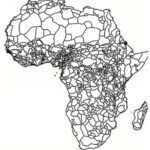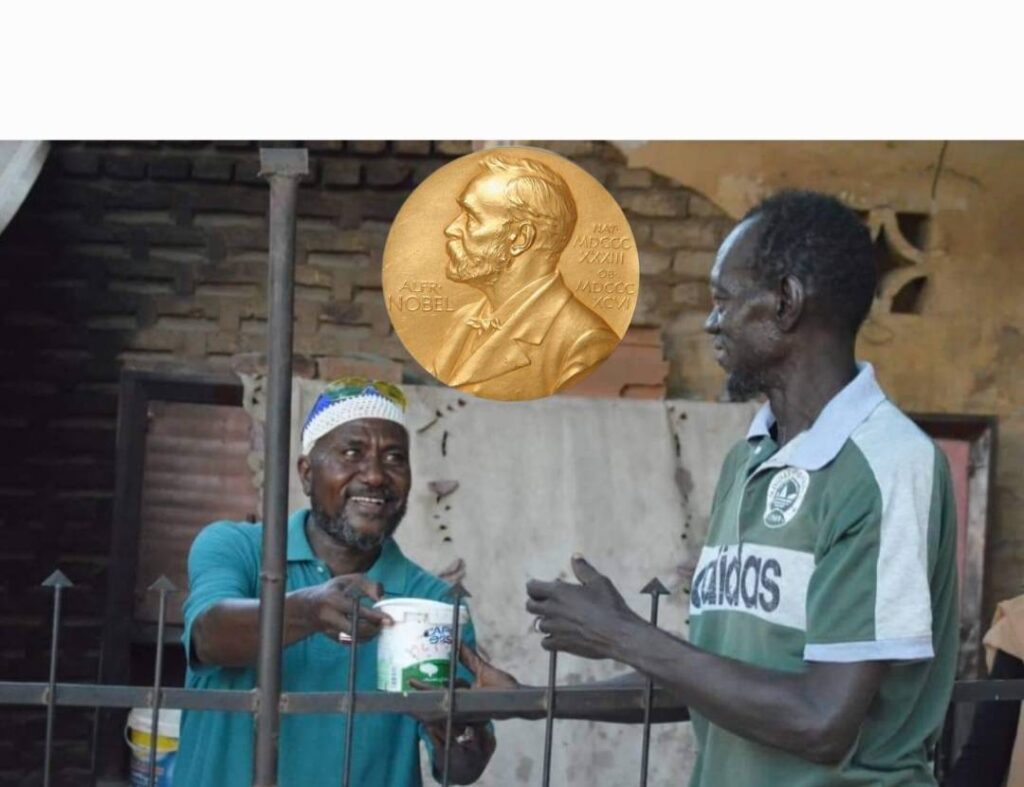The long rainy season is over in Sudan and the war and aid are resuming. The dried-up dirt roads are making large-scale warfare possible again and trucks stuck in the mud are moving to help the victims. However, in what is now being called the world’s largest humanitarian crisis, the major international aid organizations are not playing a leading role. Sudanese youth in Emergency Response Rooms are keeping starving civilians alive and traders navigate a complex network of militia roadblocks to maintain commercial activities. The Response rooms were candidate for the Nobel peace prize this year. The two warring parties are general Hemedti’s paramilitary Rapid Support Forces (RSF) and President Burhan’s government army.
“It’s amazing how Sudanese still find ways to help each other,” praises one foreign aid worker the so-called emergency kitchens. The international aid workers left the capital Khartoum when the fighting started there a year and a half ago. The government army and the RSF then thwarted their attempts to bring in aid, or stole goods. “Food is being used as a weapon by both sides,” says the aid worker. The emergency committees in Sudan are currently working to address the existing void. In areas where devastation is extensive and the conflict is intense, soup kitchens are offering much-needed assistance. The widespread destruction in Khartoum, along with the surrounding cities of Omdurman and Bahri, has rendered ordinary life unfeasible, with residences and tall structures being occupied by snipers. “Without the Sudanese emergency committees we would not have been able to do anything about the extremely critical food situation,” says the aid worker.
The cooperation between the foreign aid workers and the soup kitchens got off to a slow start. Because in order to account for the spending of their funds, the aid organizations have to observe strict rules. In a war of destruction such as in Sudan, where foreigners can hardly reach the hotbeds, these regulations cannot be complied with. “We conclude an agreement with each food committee and then transfer money to them. Sudanese in the diaspora also transfer money. They try to buy local food with these donations.” If they succeed, the soup kitchens serve a hot meal—usually a lean porridge of sorghum, lentils, or beans—once or twice a day.
In Khartoum and its surrounding areas, numerous emergency aid facilities are functioning, providing assistance to approximately 500,000 families. In the western region of Darfur, these emergency committees have recently benefited from support from international organizations. The soup kitchens were established by the Resistance Committees, which played a crucial role in the popular revolution that ended the three-decade-long Muslim fundamentalist regime of President Omar al Bashir in 2019.
According to the UN, more than half of Sudan’s population – 25.6 million people – is experiencing acute hunger and is in urgent need of aid. In the worst-affected areas, residents have been displaced or besieged in their homes. In displaced persons camps in Darfur, a famine has been officially declared by the UN.
The emergency committees could not function without the efforts of traders. Sudan is famous for its transport sector. Dilapidated but beautifully painted lorries penetrate almost every corner of the difficult country on journeys that can sometimes last for weeks, and there is always something to trade. The war makes travel difficult, but trade continues to a limited extent.
“Truck drivers risk their lives to deliver our goods,” says trader Al-Sadiq Fadol (30) by telephone in the town of Adilla in the East Darfur region. Fadol was a teacher, but all schools in Sudan have closed their doors or have become refuges for displaced people. “Our region is under the control of the RSF, but allied militias hold sway at many of the roadblocks,” he says. The checkpoints consist of pieces of wood placed on car tires and are manned by unruly militiamen with AK’47s who demand hundreds of dollars to let you pass. “Trucks go to trade agricultural products from our region in Northern Sudan. Then they first have to pay taxes to the RSF and then to the government army. They even have to pay a religious tax.”
The RSF and the government army both aim their anger on the volunteers operating soup kitchens. Prior to the conflict, the RSF and the government forces collaborated to dismantle the Resistance Committees, and now they harbor significant distrust towards individuals associated with the soup kitchens, many of whom were previously involved in the Resistance Committees. Both factions have carried out executions of volunteers based on suspicions of collaboration with opposing forces. And as part of their military strategy, both warring parties want to prevent food from reaching all areas, including those of the enemy.
In the series of wars since independence in 1956, such as the one in the now independent South Sudan, international organizations delivered aid to all, including rebel areas, and that gave the rebels some kind of legitimacy. The RSF, supported by the United Arab Emirates, controls most of the territory. The government army, supported by Egypt and Iran among others, has not yet achieved a single major victory. At the start of the dry season and the renewed fighting, they managed to cross one bridge over the Nile but gained little ground on the RSF. Both parties say they want to continue fighting for a long time and show little interest in peace talks. The need for the emergency rooms remains.
A solution to the conflict is also so difficult because the war zone has become increasingly fragmented. Both the RSF and the government army are deploying militias, and more and more neighboring countries are also getting involved in the conflict, such as Eritrea and Chad. The RSF originally comes from Darfur but surprisingly expanded its activities east of the Nile at the beginning of this year, where the position of the government army seemed stable. It uses locally recruited fighters, who are allowed to plunder as a reward. Muslim fundamentalists are gaining influence on the government side, those who were ousted from power by President al Bashir in 2019. All parties commit gross violations of human rights. The RSF has also been accused of ethnic cleansing, specifically exterminating black African communities, such as the Masalit people in West Darfur last year, resulting in the deaths of approximately 15,000 civilians. The International Criminal Court (ICC) has initiated an investigation into these massacres. In total, 150,000 civilians are said to have died from hunger and violence.
This article was first published by the NRC in 14-10-2024

